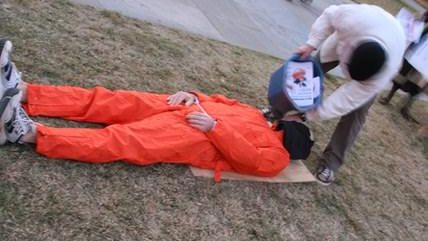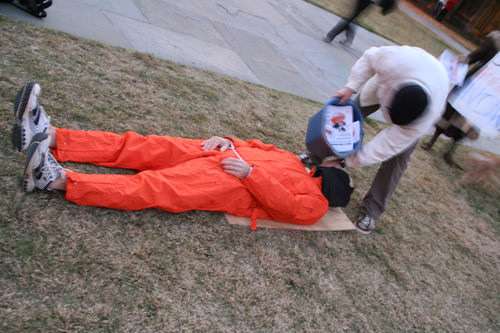Will Senate's Anti-Torture Report Be Used to Bolster NSA Snooping Defenses?


Sources have told the Associated Press (watch out for another round of phone record-snatching, guys!) that the Senate Intelligence Committee report at the center of a fight between the committee and the CIA confirms what many observers knew or suspected: Waterboarding and harsh interrogation techniques did not provide any useful information to catch Osama bin Laden. In every case where the CIA used torture and claimed it helped, there were other explanations as to where they got the information.
The most high-profile detainee linked to the bin Laden investigation was Khalid Sheikh Mohammed, whom the CIA waterboarded 183 times. Mohammed, intelligence officials have noted, confirmed after his 2003 capture that he knew an important al-Qaeda courier with the nom de guerre Abu Ahmed al-Kuwaiti.
But the report concludes that such information wasn't critical, according to the aides. Mohammed only discussed al-Kuwaiti months after being waterboarded, while he was under standard interrogation, they said. And Mohammed neither acknowledged al-Kuwaiti's significance nor provided interrogators with the courier's real name.
The debate over how investigators put the pieces together is significant because years later, the courier led U.S. intelligence to the sleepy Pakistani military town of Abbottabad. There, Navy SEALs killed bin Laden in a secret mission.
The creation of this report, still classified (though at this point the contents are probably one of the worst-kept secrets in D.C.), prompted a squabble between the CIA and the Senate Intelligence Committee over access to an internal CIA report that allegedly came to the same conclusion. The conflict caused Sen. Dianne Feinstein (D-Calif.) to take an unusual stand, at least for her: She came out against government surveillance. Or rather, she came out against government surveillance of Senate staffers. The CIA has reportedly snooped in Senate Intelligence Committee computers to try to determine how staffers got access to this internal report (Feinstein claims the CIA itself provided access to the report).
The real lesson of the report, though, is that we all have foreign surveillance and the National Security Agency (NSA) to thank for helping get to bin Laden:
Without providing full details, aides said the Senate report illustrates the importance of the National Security Agency's efforts overseas. Intelligence officials have previously described how in the years, when the CIA couldn't find where bin Laden's courier was, NSA eavesdroppers came up with nothing until 2010 - when Ahmed had a telephone conversation with someone monitored by U.S. intelligence.
At that point, U.S. intelligence was able to follow Ahmed to bin Laden's hideout.
So we need to keep an eye out for the inevitable straw man arguments about the NSA's metadata collection efforts. The objection has always been to the mass collection of the phone records of millions upon millions of innocent Americans. It is not an argument that the NSA shouldn't be attempting to track suspected foreign terrorists overseas. It's easy, though, to see how this report, once declassified, could be used to defend any form of NSA surveillance.


Show Comments (15)